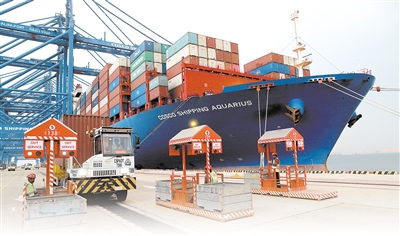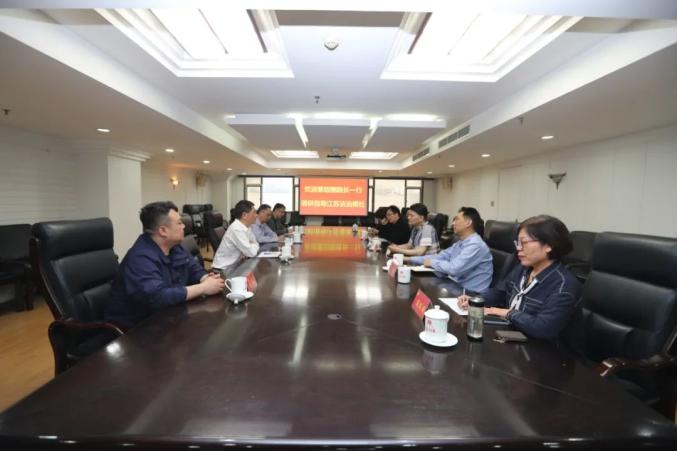Trump Did Not Expect That In The Last 24 Hours, 54 Countries Took The Lead In China: Let China Become A Global Guide
Trump Did Not Expect That In The Last 24 Hours, 54 Countries Took The Lead In China: Let China Become A Global Guide
Trump did not expect that in the last 24 hours, 54 countries took the lead in China: Let China be the global guide, China, the United States, the European Union, the United Nations, the global guide, tariff stick, Donald Trump
According to Minnan.com, on August 11, Trump signed a truce to extend the tariff truce against China. At the same time, another drama was staged on the international stage. The 53 African countries and the African Union representatives have a total of 54 parties, collectively moving closer to China. Zero tariff cooperation, industrial chain linkage, and multilateralism promise to push China to the core of global governance. This is an economic choice, and it is also a negation of the logic of power - Trump's "America First" is facing a joint boycott by emerging worlds.

1. The tariff war tear opens up global rifts, and China rewrites rules with openness
The so-called "reciprocal tariffs" in the United States are actually economic blackmail. The policy that came into effect on August 7, 2025 has brought 67 countries into the tax list, with a maximum tax rate of 41%. The 18 African countries have to pay a 15% basic tax, while the tax rates of four countries including South Africa and Libya have soared to 25%-30%. The US side used "manipulating exchange rate" and "overcapacity" as an excuse, and even Lesotho, the poorest. The Nigerian media called this "bottleneck international trade", and the South African government directly criticized that "there is no support for trade data, it is political suppression." The White House only lost one sentence, "The policy remains unchanged, and there is no explanation." The unilateral coercion cannot be hidden.
China has taken the other side and opened the door to cooperation. When the United States built a wall, China announced zero tariffs on the entire tax items of 53 African countries, including oil, minerals and agricultural products. The policy not only covers a wide range, but also implements quickly - it took a few months from proposals to customs system docking, which is in sharp contrast with the suppression of the United States. South Africa's Minister of Minerals and Energy said bluntly: "Our most critical economic partner is China, not the United States." This statement expresses Africa's desire for real cooperation.
The benefits of zero tariffs are visible. In 2024, China-Africa trade volume exceeded 2.1 trillion yuan, firmly ranking in Africa's largest trading partner for 16 consecutive years. In the first five months of 2025, China's imports from the least developed countries in Africa increased by 15.2% year-on-year, coffee imports soared by 70.4%, and cocoa beans rose by 56.8%. Specialty goods such as Rwandan dried peppers and Kenyan avocados have entered the large market of 1.4 billion people with this momentum, bringing about local employment and industrial chains. Behind this is the infrastructure support of the "Belt and Road": China has built more than 10,000 kilometers of railways and more than 100 ports in Africa, reducing trade costs from the source of logistics.
2. The 54 countries are now standing in China, and the three-layer logic is pushing the direction
Calculate the accounts economically: zero tariffs can withstand the survival crisis. US tariffs directly hit seven inches of Africa's export economy. Just talk about South Africa, if it really has to pay a 30% tax, the competitiveness of wine and minerals in China will be lost. China's zero tariffs not only protect market access, but also provide convenient measures such as construction of free trade zones and simplification of customs clearance. Nigerian economists are honest: "It is the United States that push us to China." Faced with the high pressure of the US "whoever follows me will prosper and defy me", Africa can only choose partners who can give certain opportunities.
Identify multilateralism: Don’t want to be bullied by American jungle laws. Trump regards tariffs as a "loyalty test" - allies such as Britain, Japan and Canada are all imposed taxes of 15%-35%, and the EU is unhappy and has no choice but to do so. China is different and has always been doing openness and win-win things. At the Munich Security Conference, we advocated an "equal and multipolar world" and opposed "decoupling and breaking chains"; we used more than 20% of the United Nations' membership fees to maintain multilateral mechanisms and used global development initiatives to transfusion blood to African infrastructure. South African think tanks made it thoroughly: "The United States regards the world as a chessboard, and China is building a bridge and paving the way." This difference made Africa understand that only China can give development space without being coerced.

3. Global shock: The hegemony order is loose, China ushers in opportunity
American unilateralism has forced itself to isolation. The tariff policy hurts allies and cheats himself. American farmers are afraid that soybean orders to China will affect their income, and Chicago futures prices fluctuate continuously because China's purchases are slow. High-tech enterprises have to survive by "submitting 15%-20% of sales in China for export licenses", and the "generalization of national security" is a little bit empty in the market foundation. Even traditional allies muttered privately: "Loyalty cannot be exchanged for exemptions, only the Chinese market can save lives" (said by the senior executives of South Korea and Japan).
The Chinese model has become an alternative sample. Zero tariffs are just the tip of the iceberg. China and Africa are moving from "tariff preferential treatment" to "institutional opening" - they have signed the "Framework Agreement on Common Development Partnerships" with 31 countries, which contains contents of investment protection and mutual recognition of green energy standards. Hunan Free Trade Zone has piloted the "African Food Access Pre-Assessment" to reduce the cost of direct source procurement in the entire chain. Trump wants to rely on tariffs to create a unipolar order, but China helps through market, technology and infrastructure, allowing Africa to see the real way of "the rise without relying on the West".
Multipolarization can't be stopped. Brazilian President Lula said it reasonably: "The world does not need an emperor." The 54 countries take sides, which means that the global south has woken up. ASEAN is accelerating its connection to the "Regional Comprehensive Economic Partnership" (RCEP), Latin America wants to get rid of its dependence on US dollar settlement, and unilateral hegemony is being disintegrated bit by bit by bit by bit by bit by network of cooperation. The Ethiopian ambassador to China is right: "For the first time, China allows developing countries to participate equally in setting rules", and it is a foregone conclusion to redistribute the right to speak.
4. Understand: Power should be withdrawn, and the era of builders is here
Trump's tariff stick did not defeat China, but instead became a catalyst for the unity of emerging worlds. The 54 countries choose China, after all, to choose a more inclusive global governance approach: not treat trade as a political weapon, not engage in "either or not" camp confrontation, and not allow the strong to deprive the right to development at will.
For the United States, this is the price of a strategy misreading it. Africa has turned due to the benefits of zero tariffs, and its allies bowed down due to the actual situation of the industrial chain, and unilateralism will sooner or later be marginalized by the market. For China, the opportunity lies in expanding its openness. Relying on the free trade zone to deepen capacity cooperation, using digital infrastructure to help Africa better integrate into the global value chain, carrying out green energy projects to shoulder climate responsibilities, and making the "Belt and Road" a road really an opportunity, not a control chain.

History will not look back. From returning to the United Nations to re-establishing trade rules, China and Africa have made it clear that in a world of interdependent, the real top star is not the coercion who wields a big stick, but the practical worker who bent down to build bridges. The Trump administration is still obsessed with tariff deterrence, and the international community has long voted with its feet - choosing openness, choosing equality, and choosing the future. In the future, those who write about global order will definitely be those builders who regard win-win as their pen and trust as their ink.





